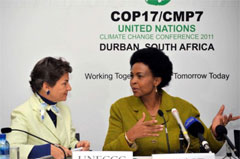After a tense couple of weeks at the 2011 UN climate meeting in Durban, South Africa, when it appeared that no agreement to replace the soon expiring Kyoto Protocol was coming, a last minute accord of a sort was reached, but many think it will carry little real weight in practice.
The Durban Platform for Enhanced Action for the first time commits all countries to cut their greenhouse gas emissions. To achieve this they have agreed to negotiate “a protocol, another legal instrument or an agreed outcome with legal force” by 2015. Whatever deal is reached then will have five years to be ratified and come into force by 2020.
Some observers have called this a "historic breakthrough" on climate change, and in one sense the language does seem to presage a significant move ahead in climate change diplomacy.
“I think this has ended up being quite a significant agreement and very much along the lines of what we’ve been pushing,” senior American climate change envoy Todd Stern this week. “That was not fully expected when we went in.”
One positive sign seen by environmentalists is that this new agreement to craft an agreement says the end result will include all the world's nations. The 1997 Kyoto agreement, which expires next year, only required industrialized countries to cut their emissions by an average of 5 percent below the levels they emitted in 1990.
But it opted out developing countries, even ones with large economies such as China, India, and Brazil, so they could use the energy needed to fuel their economic growth and reduce poverty.
The US, of course, initially signed the Kyoto agreement, but it was never sent by the President Clinton to the Senate for ratification. Just before that, the Senate had passed a resolution 95 to 0 asserting that it would not ratify any treaty that did not cover emissions from competitor nations such as China.
The Durban meeting got off to a rocky start, with Canada, Russia, and Japan all saying that they were not going to make further Kyoto-like emissions reduction commitments for a second five year period. One of Canada's delegates to Durban called Kyoto a "thing of the past," and China only offered support for a vague commitment that wouldn't start until 2020.
The Indian delegate, Jayanthi Natarajan, insisted angrily all week that India could not agree to any climate treaty that hindered her nation’s economic growth.
The overall discussions were under something of a cloud from the start, as the vague agreements reached at last year's Cancun conference included billions of dollars of payments from developed economies to developing ones, to compensate them for costs or lower growth associated with reducing their carbon emissions, costs and limits developed economies did not face at similar points in their economic histories. But with large budget deficits in Europe and the US, getting approval for such transfers would likely not be in the cards.
All this is critical for US businesses, as a new agreement that was approved by the US would probably require a national cap and trade program or carbon tax to meet the goals for greenhouse gas reduction, imposing real costs on supply chains for their carbon emissions for the first time here.
Developing Nations Commit - Sort of
The Durban Platform agreement appears to meet the requirement of the US and some Euro countries that large but still emerging economies such China, India, and Brazil make some kind of legally binding commitments to reduce their greenhouse gas emissions.
At Durban, China and India managed to water down the Berlin Mandate terminology to include “or an agreed outcome with legal force.”
According to Ronald Bailey of Reason magazine, that means that "Apparently, the Chinese and Indians believe that whatever climate negotiations do achieve by 2015, the result will be that they still will have fewer obligations to reduce their greenhouse gas emissions than will rich developing countries."
T he process is supposed to proceed something like this: he process is supposed to proceed something like this:
Developed countries all agreed that by 2015 they would adopt a treaty with binding commitments to cut their emissions (though as before how this would really be measured and enforced is not clear). How developing countries will be treated - including the subject of payments from developed economies - is still very unclear.
But in the US, that would mean this treaty as always would have to be approved by the Senate. A new administration may then choose not to send it for approval, and even if it did the Senate may not ratify it. Other countries are also likely to not approve the accord, if one is really reached.
Bailey says that "The only Durban “breakthrough” is that 20 years of climate change diplomacy didn’t totally implode. It turns out that what was achieved at the conference in South Africa was not much more than an agreement among countries to continue talking about the things they disagree about."
The Kyoto Protocol will also be extended through 2017, keeping the Euro zone's carbon permits trading exchange alive, but Canada announced it was dropping out, reducing the number of participating countries to 36 at the most.
Do you think the Durban agreement is meaningful, or just kicking the can down the road? Let us know your thoughts at the Feedback button below.

TheGreenSupplyChain.com is now Twittering! Follow us at www.twitter.com/greenscm |